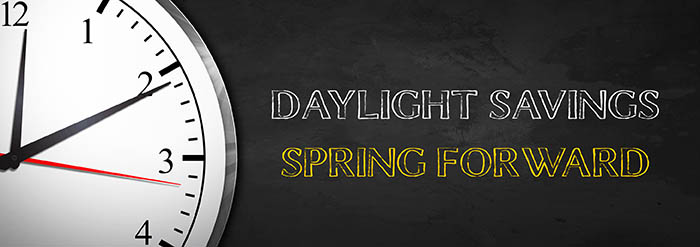Whether you like it or not, on Sunday at 2 a.m. we’ll be turning the clocks ahead an hour. After speaking about it with people in our office, I realized how divisive this event can be!
While some like the extra daylight when they leave the office, others complain about how tired they are for several weeks until their bodies adjust.
What do you think of Daylight Saving Time – good thing or not so good thing?
Let’s take a look at some of the not so good things about DST, according to msn.com:
- Daylight savings can cause sleep deprivation: By springing ahead, we can alter our circadian rhythm and this can throw us off for several weeks.
- DST can put people at greater risk for cardiovascular conditions: A 2014 study found that on the Monday after DST begins, 24% more people have heart attacks than on other Mondays throughout the year. On the flipside, the study noted a 21% decrease in heart attacks the Tuesday after DST ends.
- It can lead to an increase in workplace injuries: The 2013 Bureau of Labor Statistics’ Survey of Occupational Injuries and Illnesses reported a rise in injuries in the summer months – and a decrease in November and December, after a return to standard time.
- And more car accidents: Austin C. Smith, an assistant professor of economics at Miami University, reports a 6.3% increase in fatal car accidents for six days following the spring time change.
- You might be less productive at the office because of DST: DST might also be to blame for “cyberloafing” – the act of wasting time online at work. A series of studies conducted at Pennsylvania State University in 2012 found that on the Monday after the time change employees are more likely to browse websites unrelated to their job.
On the other hand, there are good things about Daylight Saving Time. Here are some interesting tidbits from popularmechanics.com:
- In the Western world, we typically spend more awake time in the evenings than in the mornings. We also enjoy many benefits from being awake in the sunshine. This leads to an increase in vitamin D, increased exercise, increased socializing, and overall improvements to mental health that come with sunlight.
- A paper from the Brookings Institute finds that there’s a 7% decrease in crime following the shift to DST. In 2007, when DST was extended through November 1, that drop resulted in an estimated $59 million in savings from robberies not committed. The reason is simple: crimes tend to happen much more often in darkness. Extend the daylight, and crimes, especially outdoor crimes like muggings, go down.
- Opponents of DST note that, in the week following the spring clock change, traffic accidents spike. But, DST lasts eight months, not a week, and the net effect of DST on traffic accidents is overwhelmingly positive. In fact, studies actually estimate that we could save about 366 more lives per year if we extended DST all year round. It is, very simply, easier to drive in daylight.
So remember to move any clocks – at least those that are not connected to the Internet in some way – ahead one hour.
Have a great weekend, and I hope you’re not too groggy on Monday!
Best Regards,
Taylor



I have hated dst for as long as I can remember. The only reason it was brought about was for framers to have more day light so the kids could work the farm in daylight hours before school, Well with all of the machines doing more of the work it is useless I think it should be kept this way all year round where it’s light when we go to work and light when we come home from work. It works better this way for most people thank you Robin
Not a fan.
Dislike dst very much. 63 yrs old now and haven’t ever liked it.
I love it when we go forward cause daylight longer in evenings so you can do more and enjoy family and friends outside. Wish they keep it this way year round. Don’t like it getting dark so early my body thinks it’s time for bed.
Let’s keep it this way year round and enjoy our evening outside.
For a day or two causes some discomfort with Sleep/Wake times… then benefits kick in long(er)-term.
I love “springing ahead”. I like the fact there’s more daylight during the evenings. I would love for it to stay all year like that. I’m in Florida and we have two time zones.
Do not like daylight savings tim Hosse
I hate it. I’m glad my state is starting the process to end changed the time!
I like to have more sleep on day saving time
I love “springing ahead”. I like the fact there’s more daylight during the evenings. I would love for it to stay all year like that. I’m in Florida and we have two time zones.